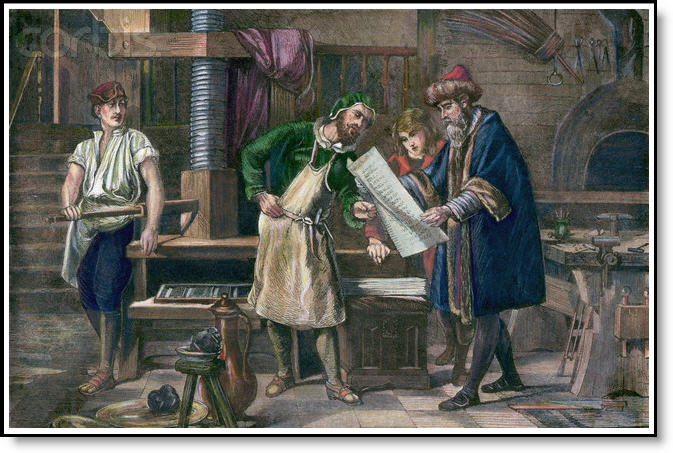Chapter 11. (continued)
The loss of much of the Romans’ practical skill, especially their
administrative abilities, kept Europe from growing dominant worldwide until the
Renaissance. At that time, these more worldly values were reborn due to a
number of factors familiar to scholars (e.g., the fall of
Constantinople, the rise of science, the discovery of the Americas, etc.). Or
perhaps, in another more causally focused view, we could say that the Christian
way, which required every citizen to respect every other citizen, built Western
society’s levels of overall efficiency up to a critical mass that made the
flowering of Western civilization now called the Renaissance inevitable. The
new hybrid value system worked: Greek theoretical knowledge and Roman practical
skills in a Christian social milieu integrated into a single, functioning whole.

Hanseatic League, city of Lubeck
It took over a thousand years for people whose lives focused on
worldly matters, instead of only on seeking salvation in the world after death,
to be seen as good Christian citizens in the community. Artists, architects,
even merchants, explorers and conquistadores finally could do what they had
always done, though now as ways of glorifying God. But in evolutionary terms, a
thousand years is almost nothing.
It is interesting to note the intricacies of the socio-historical
process. Even societies that seem to have reached equilibrium always contain a
few individuals who restlessly test their society’s accepted world view,
values, and morés. These people and their disciples are often the young, which suggests
adolescent revolt plays a vital role in the evolution of society. Teenagers
make us look at our values and, once in a while, we realize that one of those
values is due for overhaul or even retirement. Teenage revolt serves a larger
purpose in the evolutionary process of cultural change.
However, it’s more important to understand that many people in the
rest of society see these new thinkers and their followers as delinquents, and
only a very few see them as valuable. It is even more important to see that the
numbers involved on each side don’t matter. What does matter is, first, whether
the new thinkers’ ideas attract at least a few followers and, second, whether
the ideas work, which is to say, whether the followers then live better,
healthier, happier lives than the rest of the society.
A society, like any living thing, needs to be opportunistic,
constantly testing and searching for ways to grow, even though many citizens in
its establishment may resent the means by which it does so and may do everything
in their power to quell the process. Often they can, but not always. For
Western society, until the practical features of its classical beliefs were
integrated with its more humane Christian ones, Europeans largely did not
support those whose ideas and morés focused on life in this material world.
Artists, scientists, inventors, and entrepreneurs are, by their
very nature, eccentric. They don’t support the status quo, they threaten it.
But the dreamers are the ones who move the rest forward toward newer, better
ways of doing things. They only really flourish in a society that not only
tolerates but takes pride in its eccentrics. In a truly dynamic society,
cleverness is melded with kindness and acceptance of those who are different.
In short, European culture needed a thousand years to even begin to “get its
act together” and meld all of its values into a single smoothly functioning
whole.

Gutenberg checking a press proof in his shop (circa 1440)
To flourish, a society must use resources and grow when it has
opportunities to do so, or it will lose out later when events in the
environment grow harsher or when competition gets fiercer and it has few savings accumulated. How do new,
improved ways of doing things become established ways of doing things? One
means is by war, as has been mentioned. But the peaceful mechanism can also work,
and it is seen in tolerant societies when the people who use new ways are
allowed to do so undisturbed, and then they just live better. At that point,
the majority begins to pay attention and to take up the eccentrics’ ways.
This market-driven way is the way of peaceful cultural evolution,
the alternative to the war-driven one. Humans have taken a long time to reach
it, but as a species, we are almost there.
Now, where are we? What has been shown in this chapter is that
values endure down generations. In the nations of the West, Christian
respect and compassion took a thousand years to synthesize with the Greek abstract
thought and Roman practicality, but once the Western nations learned to see
science, exploration, and commerce as ways of glorifying God, material progress
had to result. Whether that progress produced a concomitant moral progress I
will deal with later in this book. For now, let’s keep following what really
did happen in the West and save what it meant in moral terms for a later
chapter.
Notes
1.
Matthew Allen Fox, The Accessible Hegel
(Amherst, NY: Humanity Books, 2005).
2.
Edith Hamilton, Mythology: Timeless Tales
of Gods and Heroes (New York, NY: Warner Books, 1999), pp. 16–19.
3. Edward Gibbon, History of
the Decline and Fall of the Roman Empire, Vol. 1 (1776; Project Gutenberg).
http://www.gutenberg.org/files/731/731-h/731-h.html.
No comments:
Post a Comment
What are your thoughts now? Comment and I will reply. I promise.